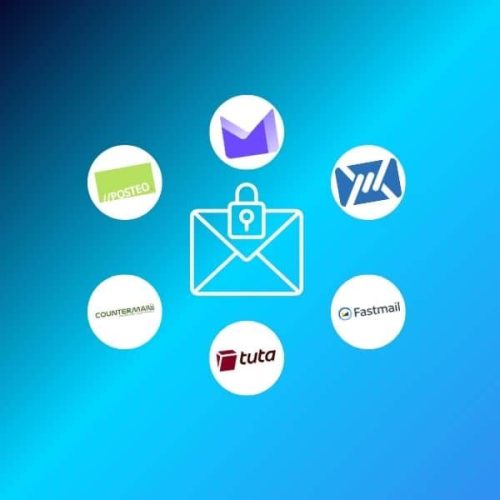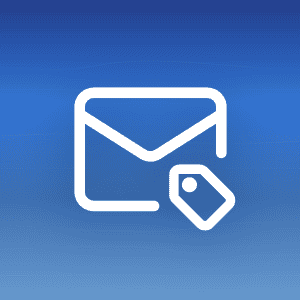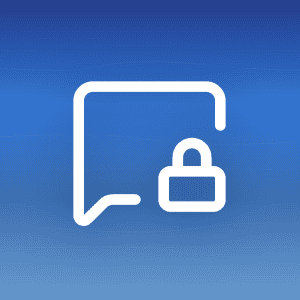Email security has become more crucial than ever. With cyber threats evolving and privacy concerns mounting, picking a solid secure email provider isn’t just nice to have anymore — it’s a must. Whether you’re a business professional handling sensitive documents, a journalist protecting sources, or simply someone who values privacy, the email service you choose can make or break your digital security.
The big names like Gmail, Outlook, and Yahoo, while convenient, don’t always deliver the strong security and privacy we need. They scan your emails for advertising purposes, store your data indefinitely, and can share information with third parties. This is where secure email providers come along with features like end-to-end encryption, locked-down systems, and a focus on keeping your data private that put you back in control of your communications.
Mailfence — Your secure Productivity Suite
Reclaim your Privacy with
- Messages
- Calendars
- Documents
- Groups
What is a Secure Email Provider?
A secure email provider protects your email communications with advanced encryption and authentication methods. It typically uses end-to-end encryption to ensure only the sender and recipient can read the messages, preventing access even by the provider. Strong authentication methods like two-factor authentication add extra security to user accounts. These providers also comply with data protection laws, minimize data collection, and use additional safeguards such as digital signatures and malware protection, prioritizing user confidentiality unlike mainstream providers that scan emails for advertising or data mining.
The 10 Best Secure Email Providers in 2026
We’ve taken a close look at the 10 best secure email providers for 2026, looking at things like how they handle encryption, their privacy rules, how easy they are to use, the extras they offer, and the cost. We’ve also included expert insights and real-world performance data to help you make an informed decision. You might wonder, “How can a private email provider like you stay neutral when you’re in the game yourselves?” Well, we want you to find the service that is right for you. We do offer many perks compared to our esteemed competition, but if you like them better, no hard feelings!
1. ProtonMail
ProtonMail offers zero-access encryption that ensures all emails and attachments remain fully encrypted on their servers. Based in Switzerland, ProtonMail benefits from some of the world’s strongest privacy laws.
| Specification | Details |
| Encryption | End-to-end encryption with zero-access architecture |
| Jurisdiction | Switzerland (strong privacy laws) |
| Storage | 1GB free, up to 3TB paid |
| Pricing | Free plan available, paid plans from $3.99/month |
| Key Features | Encrypted calendar, VPN, drive storage |
| Open Source | Yes |
Pros:
- Industry-leading encryption with PGP support
- No logs policy with Swiss privacy protection
- Intuitive interface with mobile apps
- Built-in VPN and encrypted calendar
- Excellent free tier with 1GB storage
Cons:
- Limited customization options
- Fewer integrations compared to mainstream providers
- Learning curve for advanced features
Optimal Target Group: Privacy-conscious individuals, journalists, activists, and businesses requiring maximum security without compromising usability.
See in depth how we compare: Proton Mail vs. Mailfence
2. Tuta
Tuta is recognized as one of the most secure email providers in 2026, offering comprehensive encryption and privacy features. This German-based service emphasizes open-source transparency and strict no-logging policies.
| Specification | Details |
| Encryption | End-to-end encryption for all emails and contacts |
| Jurisdiction | Germany (GDPR compliant) |
| Storage | 1GB free, up to 1TB paid |
| Pricing | Free plan available, paid plans from €3/month |
| Key Features | Encrypted calendar, secure contacts, custom domains |
| Open Source | Yes |
Pros:
- Completely open-source and transparent
- Encrypts everything including subject lines
- Built-in encrypted calendar and contacts
- Excellent mobile applications
- Strong commitment to privacy advocacy
Cons:
- Limited third-party integrations
- Smaller storage limits on free plan
- Interface can feel basic compared to competitors
Optimal Target Group: Tech-savvy users, privacy advocates, and European users who prefer GDPR-compliant services.
Curious to see how we compare? Tuta vs. Mailfence
3. Mailfence – Belgian Privacy with Full-Featured Suite
Mailfence offers a comprehensive secure email solution with integrated productivity tools, making it ideal for users who need both security and collaboration features.
| Specification | Details |
| Encryption | End-to-end encryption with OpenPGP |
| Jurisdiction | Belgium (EU privacy laws) |
| Storage | 500MB free, up to 50GB paid |
| Pricing | Free plan available, paid plans from $2.50/month |
| Key Features | Calendar, contacts, documents, groups |
| Open Source | Partially |
Pros:
- Comprehensive productivity suite
- Strong OpenPGP encryption
- Collaborative features for teams
- Competitive pricing
- EU-based with strong privacy laws
Cons:
- Limited free storage
- Some features require paid plans
Optimal Target Group: Small businesses, teams requiring collaboration, and users who want an all-in-one secure productivity suite. Service providers and agencies can also offer Mailfence’s secure platform under their own brand through private label email hosting.
4. StartMail
StartMail is a secure, ad-free email service designed for privacy-focused individuals and businesses. Created by the team behind StartPage search engine, it emphasizes user privacy above all else.
| Specification | Details |
| Encryption | PGP encryption with user-friendly interface |
| Jurisdiction | Netherlands (EU privacy laws) |
| Storage | 20GB standard |
| Pricing | $59.95/year (no free plan) |
| Key Features | Unlimited aliases, custom domains, SMTP/IMAP |
| Open Source | No |
Pros:
- Generous 20GB storage
- Unlimited email aliases
- User-friendly PGP encryption
- No ads or tracking
- 7-day free trial
Cons:
- No free plan available
- Limited additional features
- Smaller user base
Optimal Target Group: Users who prioritize simplicity, those needing multiple aliases, and customers willing to pay for premium privacy.
5. Fastmail
Fastmail positions itself as a reliable email provider for users seeking professional features without the complexity of traditional secure email services. Based in Australia, this provider focuses on speed, reliability, and business-oriented functionality.
| Specification | Details |
| Encryption | TLS/SSL encryption, encrypted at rest |
| Jurisdiction | Australia (Five Eyes member) |
| Storage | 2GB to 100GB |
| Pricing | Plans from $3/month (no free plan) |
| Key Features | Custom domains, aliases, calendar, contacts |
| Open Source | No |
Pros:
- Excellent performance and reliability
- Strong business features and custom domain support
- No advertising or data mining
- Comprehensive calendar and contact management
- Excellent mobile and desktop app integration
Cons:
- No end-to-end encryption available
- Fastmail controls the encryption keys, which raises concerns regarding privacy and security
- Based in Australia (Five Eyes surveillance alliance)
- No free plan available
- Less privacy-focused than dedicated secure providers
Optimal Target Group: Small businesses, professionals who prioritize performance over maximum privacy, and users wanting Gmail-like features without Google’s data collection.
Curious to see how we compare? Fastmail vs. Mailfence
6. CounterMail
CounterMail is recommended as the most secure email provider for users requiring maximum security. Based in Sweden, it offers diskless web servers and robust encryption.
| Specification | Details |
| Encryption | OpenPGP with diskless servers |
| Jurisdiction | Sweden (strong privacy laws) |
| Storage | 4GB standard |
| Pricing | $59/year (no free plan) |
| Key Features | Diskless servers, USB key login, anonymous signup |
| Open Source | No |
Pros:
- Diskless web servers for maximum security
- Anonymous registration options
- USB key authentication
- Strong encryption implementation
- No logs policy
Cons:
- No free plan
- Limited storage
- Steep learning curve
- Basic interface
Optimal Target Group: High-risk users, activists, journalists, and individuals requiring maximum security and anonymity.
See how we compare: Countermail vs. Mailfence
7. Posteo
Posteo is recommended for individuals in high-risk situations who need reliable security. This German provider combines environmental consciousness with strong privacy protection.
| Specification | Details |
| Encryption | End-to-end encryption with OpenPGP |
| Jurisdiction | Germany (GDPR compliant) |
| Storage | 2GB to 20GB |
| Pricing | €1/month |
| Key Features | Green hosting, calendar, anonymous payment |
| Open Source | Partially |
Pros:
- Very affordable pricing
- Environmentally sustainable
- Anonymous payment options
- Strong German privacy laws
- Calendar and contacts included
Cons:
- No free plan
- Limited storage on basic plan
- Simple interface
- Fewer advanced features
Optimal Target Group: Environmentally conscious users, budget-conscious individuals, and those preferring German privacy standards.
See how we compare: Posteo vs. Mailfence
8. Mailbox.org
Mailbox.org is particularly suitable for companies seeking secure email solutions. This German provider offers comprehensive business features alongside strong security.
| Specification | Details |
| Encryption | PGP encryption with Guard feature |
| Jurisdiction | Germany (GDPR-compliant) |
| Storage | 2GB to 100GB |
| Pricing | €1/month to €9/month |
| Key Features | Office suite, video conferencing, cloud storage |
| Open Source | No |
Pros:
- Comprehensive business suite
- Competitive pricing
- Strong German privacy laws
- Video conferencing included
- Multiple domain support
Cons:
- No free plan
- Interface could be more modern
- Limited mobile app features
Optimal Target Group: Small to medium businesses, teams requiring collaboration tools, and users wanting integrated office features.
Learn how we compare: Mailfence vs. Mailbox.org
9. Zoho Mail
Zoho Mail is recommended for companies requiring secure email with comprehensive business features. This Indian provider offers extensive integration with productivity tools.
| Specification | Details |
| Encryption | TLS/SSL encryption with S/MIME support |
| Jurisdiction | India (with global data centers) |
| Storage | 5GB free, up to 1TB paid |
| Pricing | Free plan available, paid plans from $1/month |
| Key Features | CRM integration, office suite, mobile apps |
| Open Source | No |
Pros:
- Excellent free plan with 5GB storage
- Comprehensive business integration
- Strong mobile applications
- Competitive pricing
- No ads even on free plan
Cons:
- Less focus on privacy compared to others
- Data centers in multiple jurisdictions
- Limited encryption options
- Business-focused rather than privacy-focused
Optimal Target Group: Small businesses, startups, and users needing integration with business productivity tools.
10. Guerrilla Mail
Guerrilla Mail offers temporary, disposable email addresses for situations where you need quick, secure communication without long-term commitment.
| Specification | Details |
| Encryption | Basic encryption for temporary use |
| Jurisdiction | Multiple locations |
| Storage | Temporary (emails deleted after 1 hour) |
| Pricing | Free |
| Key Features | Disposable addresses, no registration |
| Open Source | No |
Pros:
- Completely free and anonymous
- No registration required
- Immediate access
- Perfect for temporary needs
- No data retention
Cons:
- Not suitable for long-term use
- Limited security features
- Emails automatically deleted
- No customer support
Optimal Target Group: Users needing temporary email addresses, those avoiding spam, and individuals requiring anonymous communication for short periods.
Comparison Table of the 10 Best Secure Email Providers
| Provider | Encryption | Free Plan | Starting Price | Storage | Jurisdiction | Best For |
| ProtonMail | End-to-end | Yes | $4.99/month | 1GB-3TB | Switzerland | General users |
| Tuta | End-to-end | Yes | €3/month | 1GB-1TB | Germany | Privacy advocates |
| Mailfence | OpenPGP | Yes | $2.50/month | 500MB-50GB | Belgium | Teams / Security |
| StartMail | PGP | No | $59.95/year | 10GB | Netherlands | Simplicity |
| Fastmail | – | No | $3/month | 2GB-100GB | Australia | Business |
| CounterMail | OpenPGP | No | $59/year | 4GB | Sweden | High security |
| Posteo | OpenPGP | No | €1/month | 2GB-20GB | Germany | Budget users |
| Mailbox.org | PGP | No | €1/month | 2GB-100GB | Germany | Business |
| Zoho Mail | TLS/SSL | Yes | $1/month | 5GB-1TB | India | Business |
| Guerrilla Mail | Basic | Yes | Free | Temporary | Multiple | Temporary use |
Understanding Secure Email Providers: Privacy vs. Security vs. Encryption
When evaluating secure email providers, it’s crucial to understand the distinction between privacy, security, and encryption — three related but distinct concepts that are often confused.
Privacy refers to your right to control who has access to your personal information and communications. In email terms, this means ensuring that only you and your intended recipient can read your messages, and that third parties (including your email provider) cannot access your data for advertising or other purposes.
Security encompasses the broader set of measures designed to protect your email account and data from unauthorized access, including strong authentication, secure servers, regular security updates, and protection against various cyber threats like phishing and malware.
Encryption is a specific security technique that converts your readable messages into coded format that can only be deciphered with the correct key. End-to-end encryption encrypts email all the way from the sender to the recipient, usually using Pretty Good Privacy (PGP) encryption.
We got a real wake-up call about email security when Lavabit had to shut down on August 8, 2013, after the U.S. Federal Government ordered it to turn over its Secure Sockets Layer (SSL) private keys, in order to allow the government to spy on Edward Snowden’s email. This incident highlighted the vulnerability of traditional email services to government surveillance and the need for truly secure alternatives.
A simple message on the CERN Facebook group by computer scientist Andy Yen, after whistle-blower Edward Snowden revealed the NSA’s mass surveillance in 2013, sparked the idea of a secure email encryption service, which eventually became ProtonMail.
According to Usman Din, a cybersecurity pro at Mimecast, “As threat actors grow more sophisticated and organizations face increasing regulatory pressures, we expect to see some new (and not so new!) trends in email security for 2026: increased focus on AI-powered threat detection and response, growing use of obfuscation techniques, rising demand for API-based and cloud-native email security solutions, zero trust integration with email security [and] increased use of post-delivery protection and remediation.”, making the choice of a secure email provider more critical than ever.
Key Considerations When Choosing Your Secure Email Provider
Encryption Standards
It’s important that all email communication be secure and encrypted. Look for providers offering end-to-end encryption, preferably using established standards like OpenPGP. Zero-access encryption is ideal, ensuring even the provider cannot read your emails.
Privacy Policy and Jurisdiction
Review the provider’s privacy policy carefully. Providers based in countries with strong privacy laws (Switzerland, Germany, Iceland) typically offer better protection than those in countries with extensive surveillance programs.
Ease of Use
Consider how the transition will affect your daily workflow. Some providers offer interfaces similar to mainstream services, while others may require learning new processes. Factor in mobile app availability and integration with your existing tools.
Feature Set
Evaluate what features matter most to you:
- Storage capacity and limits
- Email aliases and custom domains
- Calendar and contact integration
- Collaboration tools for teams
- Mobile application quality
- Import/export capabilities
Cost Structure
While free plans are available, paid plans typically offer better features, more storage, and enhanced security. Consider the long-term value and whether the provider’s pricing model aligns with your budget and needs.
The Growing Importance of Email Security in 2026
We’ve seen a noticeable uptick in sophisticated email attacks lately, with cybersecurity experts like Bruce Schneier noting the importance of following developments in the field. As one of the top cybersecurity experts in the USA, Brian Krebs continues to report on the evolving threat landscape through his dedicated cybersecurity investigation site. This escalation in cyber threats makes the choice of a secure email provider more critical than ever.
When using big tech services that do not use built-in encryption, your email account is vulnerable to tracking, phishing and other cybersecurity attacks. Google, Microsoft and Yahoo Mail are definitely not the most secure email providers and do not offer the best email for privacy.
Switching to secure email isn’t only about keeping business stuff safe — it’s also about staying in control of your online life. Whether you’re a journalist protecting sources, a business professional handling confidential information, or simply someone who values privacy, choosing the right secure email provider is an investment in your digital security and peace of mind.
As we move through 2026, the importance of secure email communications will only continue to grow. The providers listed in this guide represent the best options available, each offering unique strengths for different user needs and threat models. Take time to evaluate your specific requirements, try the free plans where available, and make an informed decision about which provider best serves your security and privacy needs.
Remember, the most secure email provider is only as strong as your overall security practices. Combine your choice of a secure email provider with strong passwords, two-factor authentication, and regular security updates to create a comprehensive defense against today’s evolving digital threats.
And there you have it! Comment down below, if you have questions or doubts. If you want to hear more privacy-related content give our newsletter a follow!
Get the latest privacy news in your inbox
Sign up to the Mailfence Newsletter.
Your Mailfence Team
FAQ: About Secure Email Providers
Which email provider offers the highest security level in 2026?
ProtonMail is widely considered one of the safest encrypted email services available, thanks to its zero-access encryption architecture and Swiss privacy laws. Proton Mail prioritizes ease of use and automation. It simplifies encryption for the average user, but sacrifices flexibility and visibility for those who want full cryptographic control. Mailfence goes one step further when it comes to key management by providing an integrated keystore.
However, for users requiring maximum security, CounterMail’s diskless servers and anonymous registration options provide an even higher level of protection.
The “most secure” provider depends on your specific threat model. For general users, Mailfence or Tuta offer excellent security with user-friendly interfaces. For high-risk individuals, CounterMail or Posteo might be more appropriate, despite their steeper learning curves.
What is a secure email provider?
A secure email provider is a service that prioritizes the protection of your communications through various technical and policy measures. Unlike mainstream providers that may scan emails for advertising or share data with third parties, secure email services typically offer:
- End-to-end encryption to protect message content
- Zero-access architectures, preventing provider access to your data
- Strong privacy policies limiting data collection and sharing
- Open-source code for transparency and security auditing
- Jurisdiction in privacy-friendly countries
- No advertising or tracking mechanisms
Why does encryption matter so much in email services?
Encryption doesn’t stop hackers from intercepting your messages. However, if they don’t have a private key, all they would get is scrambled data that is completely unreadable. This protection is crucial because:
- Email travels across multiple servers and networks where it can be intercepted
- Government agencies may request access to your communications
- Data breaches can expose millions of email accounts
- Employers or ISPs might monitor your communications
- Cybercriminals can use intercepted emails for identity theft or blackmail
Without encryption, your emails are essentially digital postcards that anyone with access to the mail system can read.
How does email encryption actually protect my messages?
Email encryption works by converting your readable message into a coded format using mathematical algorithms. End-to-end encryption guarantees that your emails are only accessible by you and the intended recipient, and zero-access architecture stores your user data in a way that makes it impossible to be accessed by the email provider or any third party.
The process typically involves:
- Your email client generates a public-private key pair
- You share your public key with correspondents
- When sending an encrypted email, the message is encoded using the recipient’s public key
- Only the recipient’s private key can decode the message
- Even the email provider cannot decrypt the message content
What’s the best free secure email provider available?
Mailfence’s free plan is recommended as the top free secure email provider, offering 500MB of storage with full end-to-end encryption including a productivity suite. Tuta also provides an excellent free tier with comprehensive encryption features.
For users specifically needing free services, consider:
- ProtonMail Free: 1GB storage, full encryption, mobile apps
- Tuta Free: 1GB storage, open-source, calendar included
- Zoho Mail Free: 5GB storage, though less privacy-focused
Do I need to change my email address to get encryption?
Not always — it really depends on what you’re using now.
If you’re using mainstream providers (Gmail, Outlook, Yahoo), you’ll likely need to create a new account with a secure provider to get true end-to-end encryption.
If you want to keep your current address, you can:
- Use email clients with PGP support (like Thunderbird) with your existing account
- Set up email forwarding from your old account to your new secure one
- Gradually transition by informing contacts of your new secure address
For business users, many secure providers offer custom domain support, allowing you to keep your professional email address while upgrading to secure infrastructure.



